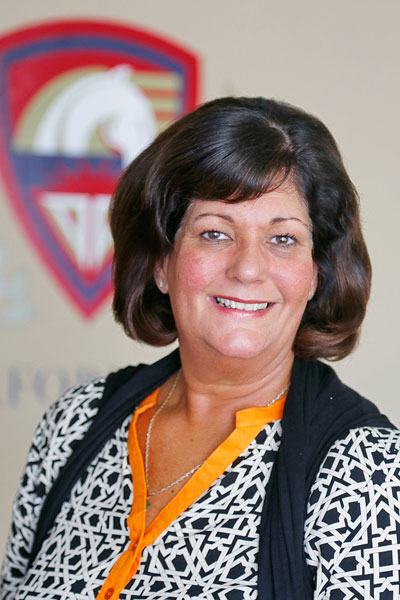Addiction & The Family
Near the conclusion of a patient’s stay at Oxford Treatment Center, their family members can attend a virtual Intensive Family Therapy Program.
During this program, therapists help family members understand the disease of addiction and express the ways they’ve been hurt by it. They take part in a powerful time of sharing, focused on healing and communication. Then, families hammer out plans for how best to support their loved one’s sobriety after treatment.
Family Program Coordinator Dee Meux, ICADC, has been helping individuals and families overcome addiction for more than 25 years.
Q&A with Dee Meux, ICADC
What are some of the most important messages your program offers to families?
“One of the things we help them understand — right inside the door, within the first hour — is that this is not your fault. They walk in expecting to be judged, perhaps passively aggressively criticized. So right off the bat, we help them realize they’ve been doing the normal thing.
“When you love someone, it’s normal to want to help them out — bail them out, fix things, give them second, fourth, fifth chances. Whereas, when you’re dealing with active addiction, those are some of the worst things you can do.
“Initially, it’s awkward for them to change that way of thinking. But once they realize that the best way to love an addict is to help set boundaries and to take care of themselves in that whole process, they’re empowered to help in a different way.”
For families that have dealt with the addiction privately, how does their perspective change when they are part of a multi-family setting?
“I talk about that at the beginning of our session: ‘You’re in here looking at all these people, thinking, “I’m not going to talk about my personal stuff in front of them.”’ I tell them, ‘Count back 30 to 45 days ago. Glance around the room, and realize every single person in the room was exactly where you were — seeing these often-horrific behaviors related to an alcoholic or addict hitting rock bottom and coming into treatment. Right now you’re feeling awkward, but by the time you leave here, you will feel like you’ve known some of these people your whole life.’ And we do have people exchange phone numbers and meet each other later.
“Patient families absolutely need to know they’re not alone. This process is about being able to open up and remove the shame and guilt and the secrets of addiction — being able to come up out of it. Family members are hungry for that, and they don’t even know it. When these families watch each other do this work, they feel like they’re looking in a mirror. There’s so much camaraderie and fellowship and healing that results from them being educated together, but also from them being with each other as they put into words what’s been going on.”
How central is the Family Program in Oxford Treatment Center’s treatment model?
“I think it’s the biggest intervention we do in the residential-treatment experience. Everything kind of leads up to this.
“The patient is detoxed from substances and has had time to begin processing the ways in which their addiction has affected those around them. The family, too, in a different way, is ‘detoxed’ from the intensity of the situation after having a few weeks away from their loved one. We now have a setting for sober communication on both sides, and it’s powerful. There’s a lot of emotional release involved.
“The patient presents their discharge plan in detail — what they’re going to do now — and the family members get to ask questions about that. We put it on the table for discussion and they’re able to talk through it together, thinking about the role each of them has in supporting their loved one’s long-term sobriety.”
Why has Oxford Treatment Center placed such an emphasis on treating families as well as patients?
“The whole family needs to be treated, so that everyone has an opportunity to come out of the denial that enabled or allowed or, worse, financed the disease.
“If there is no change in the family system, it will be very difficult for the patient to stay sober, especially in that first year. Even so, a robust family program is not something that every treatment facility offers. What we provide is fairly unique and is one of the things that sets Oxford Treatment Center apart.
“The work that we do with families teaches them that it’s not their fault and shows them new things to do. We empower them to find their voices and give expression to how they’ve been impacted by the disease of addiction. We equip them to support their loved one in recovery. And, most of all, we offer hope.”
About Dee Meux
 Dee directs Oxford Treatment Center’s Intensive Family Therapy Program. She studied at the University of Florida and Blue Mountain Bible College, and has worked in the field of addiction with adolescents, adults and families for more than 25 years.
Dee directs Oxford Treatment Center’s Intensive Family Therapy Program. She studied at the University of Florida and Blue Mountain Bible College, and has worked in the field of addiction with adolescents, adults and families for more than 25 years.
Her honors through the Mississippi Association of Addiction Professionals include Counselor of the Year (1996) and the R.T. Douglas Service Award.
For further reading on adiction and the family, Dee recommends: “Everything You Need to Know about Chemical Dependence: Vernon Johnson’s Complete Guide for Families” by Vernon Johnson.
“We equip them to support their loved one in recovery. And, most of all, we offer hope.”
Five Common Experiences for Families With Addiction
Every family’s story is unique. But when people who’ve experienced addiction in a loved one meet for Oxford Treatment Center’s Intensive Family Therapy Program, they quickly find they have a lot in common.
Among the experiences Family Program Coordinator Dee Meux hears most often in her groups are:
1. Financial Drain
Even before a family is faced with the cost of sending their loved one to treatment, the person in active addiction has typically been using their family to fund their habit in one way or another. Says Meux: “The reality is, no addict or alcoholic is ever going to go to a family member and say, ‘I need money for drugs.’ They’re going to need it for gas, or a utility bill. Sometimes they steal and call it ‘borrowing.’ But addicts never pay anything back.”
2. Shame and Embarrassment
Parents who have a grown child in active addiction often try to maintain secrecy about what their child has done and fear that others will find out. “The framework in which we live says: You have children, they go off to college and get their degrees, they marry good people and have children, and they’re successful in life,” Meux says. “When your child is an addict or alcoholic who will never be able to fit that mold until they get sober, the shame you feel is always present.”
3. Legal Consequences
For many patients who come to Oxford Treatment Center, getting treatment for addiction is mandated by a court after an arrest. “Legal intervention can be good leverage when you’re confronting denial,” Meux says. “A lot of families will work hard initially to bail their loved one out, or to buy them out with the most expensive lawyers. But when they let the addict actually experience the consequences of a legal charge, it interrupts the denial process long enough that they may see things more clearly.”
4. Addiction In the Family System
Sometimes, the process of dealing with a loved one’s addiction through treatment opens the door for other family members to address their own addictions as well. In one case, a mother’s experience in treatment at Oxford Treatment Center led three other family members in two generations to also seek help. “We’ve had family members come into treatment after their spouse went through,” Meux says. “Seeing their loved one enter recovery gives them hope they could overcome addiction, too.”
5. Pain
Despite the different circumstances that led families to Oxford Treatment Center, the deep pain that addiction has wrought in their lives is something each one shares. “Sometimes their anger is holding that pain back, which is fine.” Meux says. “But the despair and the pain and the loneliness is something they’ve all experienced. That’s why it’s so powerful for them to connect with each other as they begin this recovery journey. They’ve been so isolated in all they’ve been through so far. Now, they’re no longer alone.”
Read more— Son’s Recovery Restores Family Relationships: Michael’s Story
